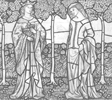Lord Dunsany
The remarkable Irish polymath Edward Plunkett, heir to an ancient barony, classical scholar, world traveler, chess player, and playwright, was the most lyrical and imaginative fantasy writer of the early 20th century.
Thanks to his short attention span, he's really at his best writing short stories.
Like many early fantasy authors, he was brought back from obscurity by the Ballantine Adult Fantasy series, so for now I'm going to stick with reviewing those editions. (JA)
|
 At The Edge Of The World (1906 - 1916, collected 1970) At The Edge Of The World (1906 - 1916, collected 1970)
This BAF greatest hits compilation is drawn from seven short story collections, and it's remarkably diverse.
Dunsany knocks off a new fantasy land in every piece, complete with exotic made-up names and musty mythological atmospheres - he's better than any other English fantasy writer at drawing from the colonial scenery and cultural knickknackery of the British empire.
When he bothers with philosophical allegories, he does it brilliantly, although he's mostly concerned with sketching creepy, doom-laden visions populated with gods, monsters, fantastical cities, and diverse landscapes.
His characters are hollow, he doesn't use much dialogue, and occasionally he tries to bring in elements of the real Edwardian world, which mostly doesn't work.
But together, this is a landmark body of work, clearly influencing writers like H. P. Lovecraft and setting a standard for fantasy writing that few others were able to meet. (JA)
|
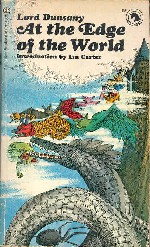
|
|
|
 Beyond The Fields We Know (1905 - 1929, collected 1972) Beyond The Fields We Know (1905 - 1929, collected 1972)
Lin Carter really started scraping the bottom of the barrel with this collection, which is a total hodgepodge.
There's Dunsany's complete novella The Gods of Pegana, his first published book from 1905.
There's a bunch of good to really good stories in his classic style, from several of the books already plundered in the previous collection.
There's Dunsany's remarkably simplistic and hackneyed 1910 play King Argimenes and the Unknown Warrior.
There's a set of bland and almost amateurish poems from his 1929 collection Fifty Poems.
And finally, there's a silly but amusing long-format pirate tale ("A Story of Land and Sea").
The collection really starts out slow, because Gods of Pagana is little more than an exercise in making up an elaborate fantasy mythology that describes a pseudo-Greek pantheon using a biblical storytelling style.
Although it presages the first part of The Silmarillion, it's a bloody bore, a bunch of irritatingly short mini-stories with incredibly sketchy characters, and basic plotlines that only rarely sport Dunsany's famous surprise endings.
And the rest is too rocky to really make up for it.
Worth checking out, but you might want to just skip through the dull parts.
(JA)
|
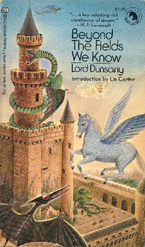
|
|
|
 Don Rodriguez: The Chronicles Of Shadow Valley (1922) Don Rodriguez: The Chronicles Of Shadow Valley (1922)
Like so much high fantasy, a coming of age story: young Rodriguez is a nobleman who doesn't inherit his father's castle because his skill with the sword and mandolin enable him to win his own castle and princess. And like so much Dunsany, the story starts off brilliantly and peters out completely. The opening chapters, where Rodriguez spends a memorable night at an inn and hooks up with the slovenly sidekick Morano, overflow with wit, charm, and a sly acknowledgment of the genre's nostalgia for a time that never actually existed. But by the half-way point, Dunsany's losing interest, and the language grows dry and mechanical as the incidents become little more than a travelogue punctuated by anticlimaxes.
Worse yet, the longer the story goes on, the more conscious you become that not only is he borrowing Don Quixote's device of a young swordsman with a naive view of chivalry and a down-to-earth foil, he's not bringing anything else to the party... stick with Cervantes.
(DBW)
|
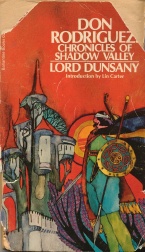
|
|
|
 The King Of Elfland's Daughter (1924) The King Of Elfland's Daughter (1924)
Dunsany's a genius, but here he just can't keep his attention focused long enough to create an engaging plotline.
I'm not sure why I should care whether the noble Alveric succeeds in his obsessive, years-long, low-budget wandering quest to recapture his long-lost elvish wife Lirazel, and their unicorn-hunting son Orion seems about as deep as the average duck-hunting redneck.
Dunsany can barely be bothered to imagine a world outside the tiny domain of Erl; the plot seems aimless in the middle; and the ending is an arbitrary anti-climax.
Still, Dunsany's vision of an Elfland where time almost stands still is strikingly beautiful, and he almost randomly throws in some bouncing, daffy trolls who really lighten things up.
His language is economical and gorgeous, and there are moments of giddy imagination all over the place.
Dunsany's more in command when he doesn't have a whole book to fill out, but if you want to reside in one of his fantasy landscapes for more than 20 minutes, you'll have to move on from the short stories. (JA)
I could've finished this one, I guess, but I really didn't see the point... Elfland, like Heaven, is a place where nothing ever happens, and the characters are faceless ciphers, so it doesn't matter where they end up. Plus, the writing is breezy, without the satisfying richness and sly asides Dunsany is prone to in other works, so there's not much impetus to keep turning the pages.
I won't give the book a rating, because I never made it to the trolls, but this isn't the place to start with His Lordship.
(DBW)
|
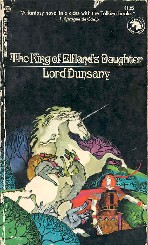
|
|
|
The Charwoman's Shadow (1926)
 - The most well-constructed work of Dunsany's I've read is also his least charming, focusing on the adventures of a pallidly sketched young man in the "Golden Age" of Spain (there's so little geographic or cultural detail it could just about be anywhere anywhen).
Don Ramon Alonzo leaves home to make a killing in the transmuted gold business by apprenticing to a rather distant and intermittently malign magician, but gets sidetracked by trying to rescue the magician's ancient female servant (you can see where that's going right away).
There is a bunch of imaginative magic going on, including the central device of both characters having literally pawned their own shadows to the creepy old guy.
Shuttling back and forth between Ramon Alonzo's small family castle, the magician's lair, and a nearby town, it's a pretty self-contained world, but Dunsany creates some involving dramatic incidents and his language is as beautiful (if not as rapturous) as always. (JA) - The most well-constructed work of Dunsany's I've read is also his least charming, focusing on the adventures of a pallidly sketched young man in the "Golden Age" of Spain (there's so little geographic or cultural detail it could just about be anywhere anywhen).
Don Ramon Alonzo leaves home to make a killing in the transmuted gold business by apprenticing to a rather distant and intermittently malign magician, but gets sidetracked by trying to rescue the magician's ancient female servant (you can see where that's going right away).
There is a bunch of imaginative magic going on, including the central device of both characters having literally pawned their own shadows to the creepy old guy.
Shuttling back and forth between Ramon Alonzo's small family castle, the magician's lair, and a nearby town, it's a pretty self-contained world, but Dunsany creates some involving dramatic incidents and his language is as beautiful (if not as rapturous) as always. (JA)
 - This was the first Dunsany I picked up, and I was hooked from the opening pages, where Ramon Alonzo recoils in horror at the thought of working for a living, and goes off to become a magician instead. The prose is distinctly otherworldly without being needlessly archaic, the plot moves at a good clip, the touches of humor never detract from the overall tone - in all of these areas, Dunsany excelled nearly all the fantasists who would come after him. And you may never take your shadow for granted again. (DBW) - This was the first Dunsany I picked up, and I was hooked from the opening pages, where Ramon Alonzo recoils in horror at the thought of working for a living, and goes off to become a magician instead. The prose is distinctly otherworldly without being needlessly archaic, the plot moves at a good clip, the touches of humor never detract from the overall tone - in all of these areas, Dunsany excelled nearly all the fantasists who would come after him. And you may never take your shadow for granted again. (DBW)
|
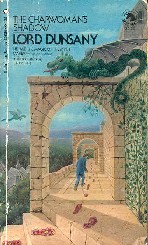
|
|
|
